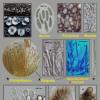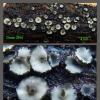
07-02-2023 22:28
Ethan CrensonHello friends, On Sunday, in the southern part of

19-02-2026 17:49
Salvador Emilio JoseHola buenas tardes!! Necesito ayuda para la ident

19-02-2026 13:50
Margot en Geert VullingsWe found this collection on deciduous wood on 7-2-

16-02-2026 21:25
 Andreas Millinger
Andreas Millinger
Good evening,failed to find an idea for this fungu

08-12-2025 17:37
 Lothar Krieglsteiner
Lothar Krieglsteiner
20.6.25, on branch of Abies infected and thickened

17-02-2026 17:26
 Nicolas Suberbielle
Nicolas Suberbielle
Bonjour à tous, Je recherche cette publication :
50293 - Disco inconnu
Roland Labbé,
09-05-2010 18:44
Voici un autre disco inconnu de Québec.
Votre aide est très précieuse pour nous.
Amitiés !
Roland
Détails :
Date de récolte: 04 / 05 / 2010
Habitat : forêt mixte
Substrat : branche morte décortiquée de peuplier faux-tremble
Sporée blanc grisâtre
Spores ellipsoïdes à subnaviculaires allongées, lisses, à 1 septum, à contenu huileux uniforme, de dimension variable, 6-12 x 2-4 µm, 9,4 x 2,8 µm en moyenne (20 spores), Q = 3,36
Asques plutôt dispersées parmi les paraphyses, à 8 spores bisériées, à contenu dextrinoïde, avec crochet à la base et avec appareil apical amyloïde, 42-58 x 4,5-6 µm (10 asques), dépassant parfois les paraphyses( ?)
Paraphyses cylindriques, lisses, à 1 septum basal, non ramifiées, à contenu huileux homogène à 95% en NaCl iso., à nombreuses grosses bulles en Lugol, 55-77 x 2-4 µm (8 paraphyses)
Poils marginaux en palissade, cylindriques, septés, moyennement arrondis à l'apex, jusqu'à 6 µm de diam.
Excipulum en textura globulosa, à globuleuses à clavées, brun foncé, jusqu'à 15 µm de largeur
Face externe formée d'hyphes rarement ramifiées et septées, à paroi légèrement épaisse, brun ochracé à brun foncé, jusqu'à 4 µm de diam.
Roland Labbé,
11-05-2010 02:26
Re:50293 - Disco inconnu
Voici la photo orignale.
Roland
Roland
Hans-Otto Baral,
24-05-2010 20:39

Re:50293 - Disco inconnu
Clearly a Mollisia. It seems that you studied this specimen in the fresh state? Only the living paraphyses contain these refractive contents which are not oleaginous which you can confirm by its dissolution in KOH. KOH is also necessary to apply whether a transient yellow colour appears from these VBs (seen already under the bino).
See Andreas Gimder's key. (ww.mollisia.de). If you have living asci (you recognize them when you add KOH, they will strongly shrink and retract below the paraphyses), please try to find out whether the spores inside are aseptate or septate. This is very important to indetify the species.
Zotto
See Andreas Gimder's key. (ww.mollisia.de). If you have living asci (you recognize them when you add KOH, they will strongly shrink and retract below the paraphyses), please try to find out whether the spores inside are aseptate or septate. This is very important to indetify the species.
Zotto


